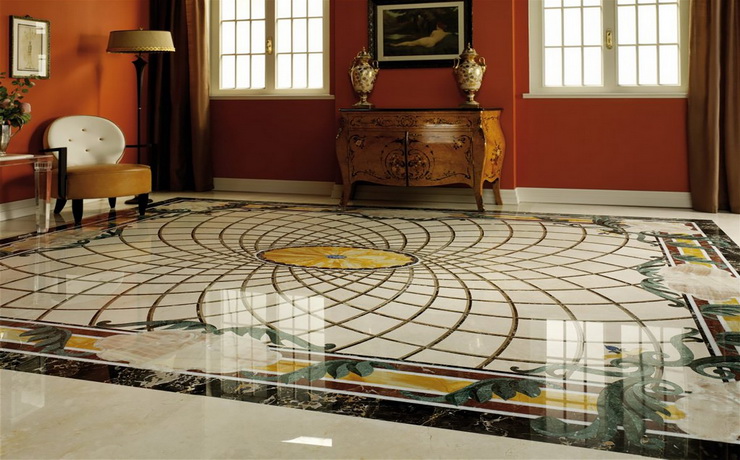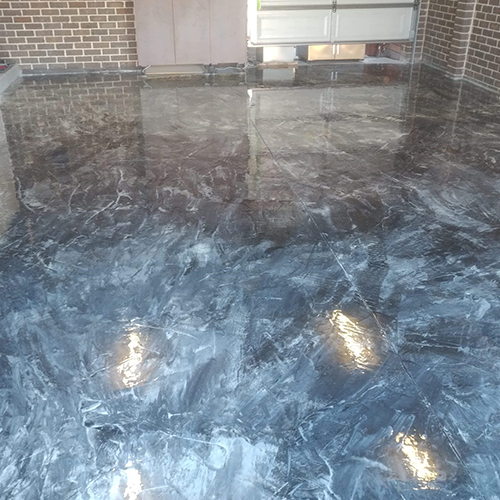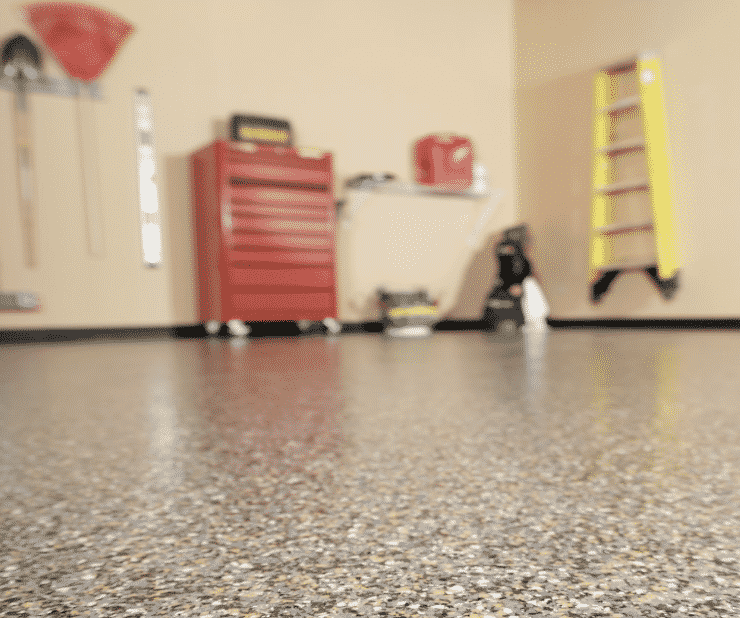Epoxy floors are robust, durable concrete coatings that can be used in many different ways. Originally used for high strength commercial and industrial environments. This robust floor system has also become increasingly popular in residential areas.
There is a lot of information about epoxy floors that we need to sort and we are here to help you! Below you will find everything you need about epoxy floors!
What is epoxy flooring?
Epoxy floors are hard, resinous floor coatings that can be applied to most hard floors. Epoxy is available in a variety of colors, styles, patterns, and textures to suit virtually any design need. This durable floor resists hard knocks, heavy abrasion and heavy foot and vehicle traffic. It is also very resistant to various chemicals as well as water. Maintenance for epoxy floors is simple and easy and only requires regular sweeping and occasional wet wiping. With proper installation and maintenance, epoxy floors can last up to 25 years or longer!
Types of epoxy floors
There are many types of epoxy available. Here are some of the most popular:
Standard epoxy
Standard epoxy is the basic style of epoxy floors. It can be used in many different colors and patterns. Some popular designs for standard epoxy include stripes, tiled patterns, and geometric shapes. However, you can also leave your epoxy in one color.
Metallic epoxy
Metallic epoxy is created by mixing metal pigments into the resin when applied to the floor. These pigments can be manipulated to create unique designs. From colorful swirls to scenes that imitate nature, such as ocean waves, fiery lava and cloud-filled skies.
Decorative flake epoxy
Decorative flake epoxy is made by applying a layer of acrylic chips over the epoxy before applying the top coat. These chips are available in many different colors, shapes and sizes. The decorative flakes can also be emitted in different quantities, from a few flakes spread over the floor to a thick coating in which you can hardly see the epoxy underneath. These flakes also give the floor a non-slip layer.
Types of epoxy floors
Three types of epoxy can be installed in your home or business. They are based on water, solvents and 100% solid epoxy.
Water-based epoxy resin
Water-based epoxies are water-soluble, making them less reactive. This type of epoxy does not contain VOCs (volatile organic compounds) or solvent odors. Water-based epoxy resin creates a strong bond with the concrete, resulting in a durable, chemically resistant surface.
Solvent-based epoxy resin
This epoxy is one of the first types of epoxy ever to be used, but is slowly being seen less and less. This is due to the high amount of VOCs and harmful fumes that are released during installation. Sufficient ventilation of the area is essential when using solvent-based epoxy.
Epoxy resin with 100% solids
This is the highest quality epoxy on the market. Instead of needing a carrier like water and solvent based, this epoxy is simply 100% solids. This commercially available epoxy resin is the most durable and long-lasting epoxy resin available. From warehouses and production facilities to garages and kitchens, epoxy resin with 100% solids is the best choice.
Advantages and disadvantages of epoxy floors
advantages
- Customization – These floors are fully customizable and offer a variety of colors and patterns for any design scheme.
- Longevity – With proper care and maintenance, epoxy floors can last over 25 years.
- Increases property value – When an epoxy floor is installed, the value of your home or business increases.
- Easy maintenance – epoxy floors are easy to maintain, giving you more time to focus on what’s important.
- Durability – This concrete coating is exceptionally durable and can withstand hard knocks and abrasion.
- Chemical Resistance – Epoxy is resistant to many different chemicals, including gas, oil, and grease, as well as stains.
disadvantage
- Slippery – If they get wet, epoxy floors can be slippery. This can be remedied by installing non-slip additives in the floor.
- Complicated installation – The installation of an epoxy floor coating is not a DIY-friendly project. It requires a lot of attention to detail, special tools and equipment as well as experience.
- Removal – If you ever change your mind about your epoxy floor, replacing it is a time-consuming and expensive project.
Final thoughts
Epoxy floors are robust, durable floors that meet the requirements of every room. With many different types and types of epoxy resins, the choices are almost unlimited. The advantages of this floor system far outweigh the disadvantages and make it the perfect choice for practically any floor. You should have all the information you need to decide if this is the ground for you!
 TopsDecor.com Home Decor Ideas
TopsDecor.com Home Decor Ideas






